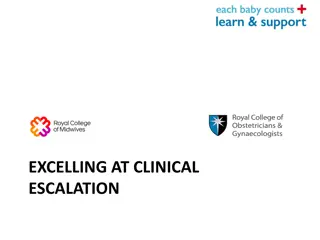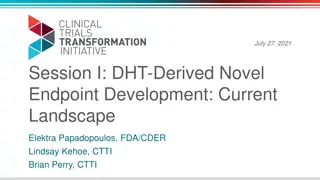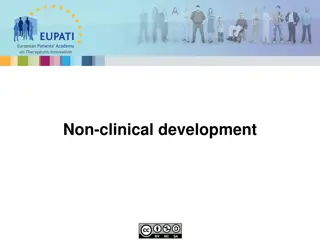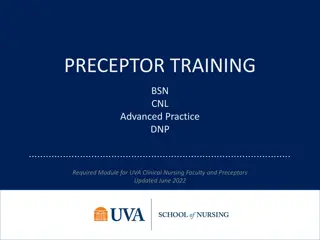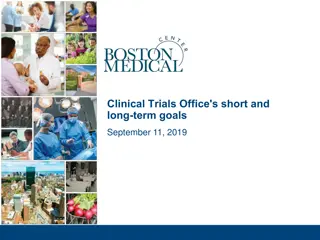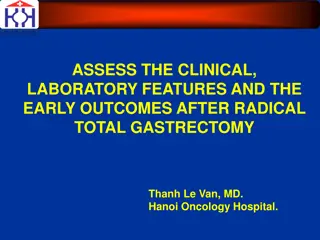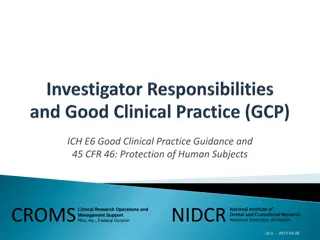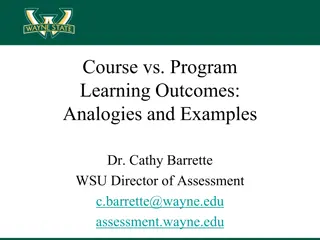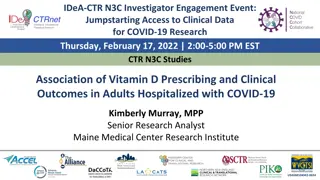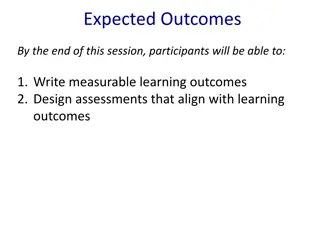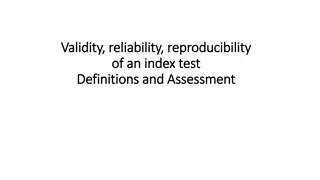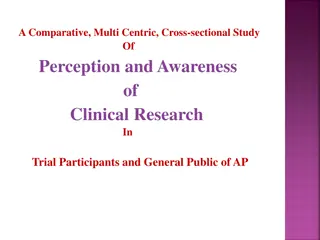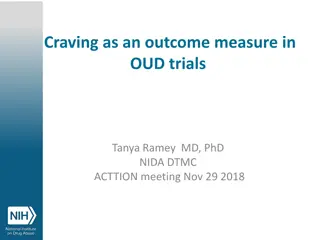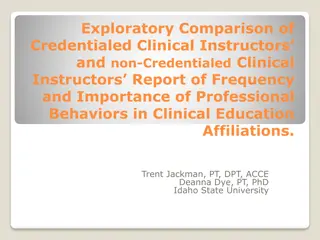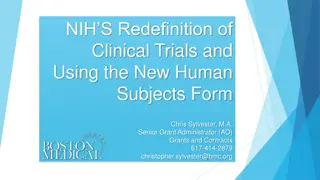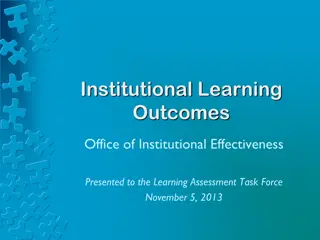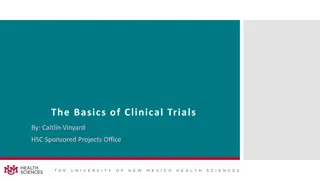Prioritizing Clinically Important Outcomes Using Hierarchical Win Ratio
Clinical trials often use composite outcomes, but conventional analysis methods have limitations in accurately reflecting clinical reality. Hierarchical outcomes offer flexibility by defining a hierarchy of events based on importance. Analyzing trials using hierarchical outcomes involves comparing p
7 views • 20 slides
Enhancing Pediatric Care with the Irish Paediatric Early Warning System (PEWS)
The Irish Paediatric Early Warning System (PEWS) has been updated to align with National Sepsis Guidance in May 2023. It aims to assist in recognizing and responding to deterioration in pediatric patients, emphasizing the importance of clinical judgment and individualized assessment. PEWS does not r
1 views • 41 slides
Overview of UW Clinical Trial Office Budget Review
UW Clinical Trial Office conducts budget reviews to ensure compliance and financial accountability in clinical trials. The office collaborates with various departments to manage billing compliance, financial risks, and institutional policies. The primary focus is on avoiding patient billing errors,
0 views • 17 slides
India Alliance Clinical & Public Health fellowship in India
India Alliance Clinical & Public Health fellowship in India\n\nIndia Alliance Clinical and Public Health Research Fellowships are for Health researchers with an MD, MS, MPH, or an equivalent clinical or public health degree, who can apply for the DBT\/Wellcome Trust India Alliance Clinical and Publi
0 views • 5 slides
FDA Perspective on Epidemiological Cut-off Values (ECVs)
The FDA presents insights on the development and use of Epidemiological Cut-off Values (ECVs) to distinguish wild-type populations from those with acquired resistance mechanisms. ECVs are crucial for determining antimicrobial susceptibility and guiding treatment decisions. The process involves analy
0 views • 13 slides
Clinical Escalation: Building Effective Communication in Maternity Units
Exploring the importance of clinical escalation in maternity units, this session outlines the components and practices involved in identifying, communicating, and acting upon clinical concerns. It emphasizes recognizing deviation from normality, effective communication, and taking appropriate action
0 views • 27 slides
Training Models in Clinical Psychology: A Comprehensive Overview
Clinical psychology training models such as the Scientist-Practitioner Model have evolved over the years to integrate science and practical expertise. The Scientist-Practitioner Model, originating in 1949, emphasizes the fusion of scientific knowledge and clinical application. It faced criticism for
1 views • 98 slides
Ethical Issues in Clinical Pharmacy Research by Dr. Haider Raheem Mohammad
Research ethics play a crucial role in clinical trials and therapeutic research in the field of pharmacy. From discovery to validation, all medicines undergo rigorous evaluation processes to ensure safety, efficacy, and freedom from adverse effects. Clinical trials in both animals and humans are ess
0 views • 20 slides
Advanced Clinical Practice Framework and Pillars of Practice
The document discusses the advanced clinical practice framework and the four pillars of practice which include leadership & management, clinical practice, education, and research. It emphasizes the importance of core capabilities and area-specific competence in advanced clinical practice. The role o
2 views • 8 slides
Digital Health Technology-Derived Clinical Outcome Assessments in Regulatory Decision-Making
This session discusses the landscape of DHT-derived novel endpoints in clinical research, focusing on considerations for regulatory decision-making. It explains the use of digital health technology in clinical outcome assessments and highlights the potential benefits of digitally collected COAs, suc
0 views • 42 slides
Objective Structured Clinical Examination (OSCE): A Modern Approach to Assessing Clinical Competence
The Objective Structured Clinical Examination (OSCE) is a modern examination method widely used in the field of health science to evaluate clinical skill performance. It involves stations where medical students interact with simulated patients to demonstrate competencies such as history taking, phys
1 views • 40 slides
NIMH Clinical Research Education and Monitoring Program Overview
NIMH's Clinical Monitoring and Clinical Research Education, Support, and Training Program (CREST) aims to ensure the proper conduct, recording, and reporting of clinical trials. This program includes clinical monitoring plans, guidelines for site monitoring activities, and independent clinical monit
1 views • 29 slides
Understanding Statistical Methods for Clinical Endpoints in Diabetes Research
This educational slide module delves into fundamental statistics for analyzing clinical endpoints in diabetes research. It covers the choice of statistical methods, the distinction between statistical and clinical significance, and the importance of different endpoints in evaluating clinical benefit
1 views • 37 slides
Understanding Ethics in Clinical Trials: A Comprehensive Overview
Explore the historical context, important ethical guidelines, and the ethical framework with 7 principles in the field of clinical trials. Learn about key trials, ethical considerations, and guidelines governing human subject research in clinical medicine. Delve into the critical aspects such as inf
1 views • 15 slides
Understanding Non-Clinical Development in Therapeutic Innovation
The European Patients Academy on Therapeutic Innovation focuses on the non-clinical development phase of medicine, delving into efficacy assessment, safety evaluation, and manufacturing process considerations. Non-clinical studies are essential for decision-making in clinical trials, marketing appli
1 views • 26 slides
UVA Clinical Nursing Preceptor Training Regulations
Virginia Board of Nursing regulations outline the role of clinical preceptors in supervising nursing students, ensuring safe client care, and enhancing clinical learning experiences. Preceptors serve as teachers, mentors, and role models, linking classroom knowledge with practical skills. Faculty me
0 views • 36 slides
Importance of Communication and Counseling Skills in Clinical Settings
Dr. Leena Baghdadi, an Assistant Professor and Clinical Epidemiologist, emphasizes the significance of effective communication and counseling skills in clinical practice. The content discusses the objectives of understanding these skills, barriers, and practical examples of counseling. Highlighted b
0 views • 27 slides
BMC Clinical Trials Office Goals and Initiatives
The BMC Clinical Trials Office (CTO) is dedicated to supporting clinical and human research at Boston Medical Center by providing leadership and expertise in research, finance, and administration. The CTO reviews, negotiates, and approves protocols, supports grants and contracts, ensures accurate cl
0 views • 17 slides
Understanding Clinical Trials: Types and Designs
Clinical trials are essential research studies that evaluate new tests and treatments to improve human health outcomes. They involve various phases, designs, and purposes, such as treatment trials, prevention trials, and observational studies. Different types of clinical trial designs include experi
7 views • 18 slides
Understanding Evidence-Based Medicine and Clinical Decision-Making
European Patients Academy on Therapeutic Innovation emphasizes the importance of Evidence-Based Medicine (EBM) in providing optimum clinical care. EBM involves systematic review and utilization of clinical research for informed decision-making, benefiting patients in disease management and treatment
7 views • 20 slides
Understanding EHCP Outcomes and Provision for Special Educational Needs
EHCP outcomes and provision for special educational needs are crucial components outlined in a child or young person's Education, Health, and Care Plan (EHCP). Long-term outcomes are categorized into learning areas, while medium-term outcomes serve as steps towards achieving long-term goals. It is i
0 views • 15 slides
Essential Aspects of the Clinical Interview in Psychology
Clinical interviews play a crucial role in the assessment conducted by clinical psychologists, showcasing essential qualities like validity, reliability, and clinical utility. Understanding the importance of feedback and honing general and specific skills as an interviewer are key components in cond
1 views • 17 slides
Clinical and Laboratory Features of Radical Total Gastrectomy: Early Outcomes
Assessing the clinical and laboratory features, as well as the early outcomes following radical total gastrectomy is crucial in the management of gastric cancer. This study conducted at Hanoi Oncology Hospital retrospectively analyzed 43 patients who underwent this procedure. The overview includes d
0 views • 27 slides
Clinical Research Guidelines and Regulations Overview
Clinical research encompasses various guidelines and regulations to ensure the protection of human subjects and the credibility of study results. Key aspects include Good Clinical Practice (GCP) standards, Title 45 of the Code of Federal Regulations (CFR) Part 46, and additional CFR sections for cli
0 views • 46 slides
Ohio Clinical Alliance: Transforming Clinical Experiences
The Ohio Clinical Alliance, through collaborative partnerships, aims to enhance clinical preparation for educators. The leadership team comprises various representatives and organizations committed to improving student learning. Their activities include retreats and meetings to ensure effective comm
0 views • 27 slides
Understanding Learning Outcomes: Analogies and Examples
Explore the concept of learning outcomes through analogies with salads and maps. Learning outcomes are specific, measurable statements of what students should know or be able to do after completing a program. Discover how outcomes differ at various organizational levels and how course outcomes contr
0 views • 10 slides
Association of Vitamin D Prescribing with Clinical Outcomes in COVID-19 Hospitalized Adults
Investigating the impact of Vitamin D prescribing on clinical outcomes in adults hospitalized with COVID-19, this study analyzes the association between Vitamin D treatment and patient outcomes such as mortality, length of stay, and need for ventilation. The research explores the complex effects of
0 views • 8 slides
Effective Design of Learning Outcomes and Assessments
This session covers writing measurable learning outcomes, designing assessments aligning with outcomes, creating assessments for specific outcomes, analyzing assessments to determine intended learning outcomes, and the importance of clarifying expectations for students and instructors through learni
0 views • 16 slides
Enhancing Clinical Trials through ICH E6 Renovation
Explore the Clinical Trials Transformation Initiative's efforts in updating ICH E6 guidelines to improve global clinical trials. Learn about CTTI's findings, insights from stakeholders, and discussions on the necessary updates for ICH E6. Engage with industry experts and regulatory authorities to un
0 views • 65 slides
Understanding the Importance of Validity, Reliability, and Reproducibility in Clinical Measurements
Clinical practice involves measuring quantities to aid in diagnosis, predict patient outcomes, and serve as study endpoints. Errors in measurements can lead to inaccurate results and affect clinical decisions. Trueness and precision, accuracy, bias, and method comparison are essential concepts in as
0 views • 25 slides
Perception and Awareness of Clinical Research in Trial Participants and the Public of Andhra Pradesh
This study focuses on understanding the perception and awareness of clinical research among trial participants and the general public in Andhra Pradesh. It highlights the importance of creating awareness about clinical research, previous study results, public attitudes towards clinical trials, and e
0 views • 24 slides
Understanding Craving as an Outcome Measure in OUD Trials
Craving plays a vital role in substance use disorder (SUD) diagnosis, with intense desires or urges triggered by environmental cues. The focus is on identifying and validating the best craving measure for OUD clinical trials. Near-term goals include qualifying craving as a Clinical Outcome Assessmen
0 views • 12 slides
Clinical Outcomes in Microsurgery for Lumbar Disc Herniation: Prospective Study
This prospective study examined the clinical outcomes in patients undergoing microsurgery for lumbar disc herniation and spinal stenosis. The study evaluated the effectiveness of surgical intervention using the Oswestry Disability Index (ODI) and Numeric Rating Scale (NRS) questionnaires preoperativ
0 views • 13 slides
Correlation of Placental Growth Factor Markers with Clinical Outcomes in Suspected Pre-Eclampsia Patients at Maidstone and Tunbridge Wells
Study examines the correlation between placental growth factor markers and clinical outcomes in suspected pre-eclampsia patients at Maidstone and Tunbridge Wells. It explores the diagnostic challenges, diagnostic issues, PET ratio test, and NICE guidelines. Objectives include validating marker appro
0 views • 19 slides
Comparison of Professional Behaviors in Clinical Education
Professional behavior characteristics play a crucial role in enhancing student learning during clinical education. This study examines the differences in reported importance and frequency of professional behaviors between credentialed and non-credentialed clinical instructors. The background outline
0 views • 28 slides
Understanding NIH's Redefinition of Clinical Trials
NIH redefines clinical trials as research studies where human subjects are prospectively assigned to interventions to evaluate their effects on health-related outcomes. The criteria for defining a clinical trial by NIH include human participant involvement, prospective intervention assignment, evalu
0 views • 7 slides
Mesa Institutional Learning Outcomes Overview
Mesa's Institutional Learning Outcomes (ILOs) focus on core values such as communication, critical thinking, global awareness, personal awareness, civic responsibility, self-awareness, interpersonal skills, and technological awareness. These outcomes are designed to guide students in acquiring essen
0 views • 13 slides
Enhancing Clinical Academic Collaboration Between Universities and NHS Trusts
Clinical academics play a crucial role in integrating clinical practice, research, and education within the NHS. Collaboration between universities and NHS trusts is key to ensure clinical academics address the right questions for patient care and societal benefit. Challenges include an aging clinic
0 views • 29 slides
ACORN Core Outcomes Research Network Overview
ACORN (ACNE CORE OUTCOMES RESEARCH NETWORK) was established in July 2013 with the aim of creating a standardized set of core outcome measures for use in acne clinical trials. Led by key individuals such as Diane Thiboutot, Jerry Tan, and Alison Layton, ACORN focuses on global representation, stakeho
0 views • 10 slides
Understanding Clinical Trials: Phases, Types, and Definitions
Clinical trials play a crucial role in advancing medical research and treatment options. This comprehensive guide covers the basics of clinical trials, including their definition, phases, types, and key definitions like IND, IDE, NDA, and more. Discover how different phases of trials work, the vario
0 views • 16 slides





